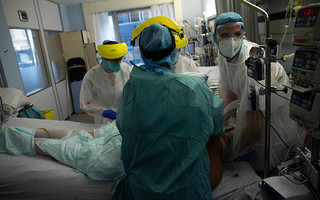There are calls for vigilance around the world as the arrival of summer coincided with a resurgence of new cases coronavirus, due to new sub-variants of Omicron. Many European countries have been facing a new rise in cases for the past few weeks.
First was the Portugal, which saw a significant increase in new cases in May, which peaked in early June at almost 30,000 cases per day. This wave has since begun to deflate.
In Britainthe cases on a 24-hour basis are again almost at the highest level since the beginning of the pandemic.



THE Italy At the same time, it recorded 30,526 new cases in a 24-hour period (Saturday to Sunday), recording an increase of 63.4% in seven days, according to the latest data from the country’s Ministry of Health.
THE Germany has the same fate.
THE France It is also not far behind, with the transmission of SARS-CoV-2 having accelerated over the past ten days in the mainland and a rate of infection that now exceeds 44,000 (on average seven days).
New sub-variants



This recovery is explained by the combination of two elements, explains to AFP Mircea T. Sofonea, lecturer in epidemiology at the University of Montpellier. On the one hand there is one “Reduction of immunity” that is, “protection against a previous disease or a dose of vaccine decreases over time.” On the other hand it is the emergence of new Omicron variantsof BA.4 and especially BA.5, which are spreading much faster benefiting from the dual advantage of transmissibility and immune escape, reports the publication of APE-MPE, citing AFP.
“We are facing an ongoing evolution of the virus, meeting people who already have antibodies – because they have been infected in the past or have been vaccinated – and who should have a selective advantage in being able to pierce them. BA.5 and to a lesser extent BA.4 are spreading in Europe. “Epidemiological data show that it is 10% more contagious than BA.2, and that is why it is taking the reins,” said Olivier Schwartz, director of the Pasteur Institute’s ion and immunity unit.
Will there be an increase in hospitalizations?



As for the severity of BA.5 “it is too early to say, in the absence of consistently documented clinical data,” Schwartz said.
The European Center for Disease Prevention and Control (ECDC) announced in mid-June that, based on still limited data, “there is no evidence that BA.4 and BA.5 are associated with an increased severity of infection relative to the variants circulating BA.1 and BA.2”.
However, as with previous waves, an overall increase in COVID-19 cases could lead to an increase in hospitalizations, intensive care unit admissions and deaths, the ECDC has warned.
The European population enjoys strong immunizations thanks to vaccines and previous infections. This offers in advance a stronger protection against the risk of developing a severe form of the disease than against the risk of re-infection, which is expected to limit the extent of the increase in hospitalizations.
In France, the “moderate epidemiological increase” of recent weeks (the number of cases more than doubled in three weeks) “is accompanied by a slight increase in hospitalizations” and is likely to cause a “shift in time” of intensive care unit Deaths, said yesterday, Tuesday, Professor Allen Fisher, who is chairman of the Vaccine Strategy Council. “Nothing dramatic will happen in the intensive care units of the hospitals,” reassured the German epidemiologist Klaus Ster.
New measures for the summer?
The ECDC called on European countries to remain vigilant, maintaining test and monitoring systems. “We expect that additional booster doses (of the vaccine) will be needed for groups at the highest risk of becoming seriously ill, awaiting future waves.”
Some countries have already announced new measures. THE Italy decided in mid-June to extend the obligation to use mask FFP2 on public transport (excluding airplanes) until 30 September. “I want to continue to recommend that you protect yourself by taking the second booster dose of the COVID-19 vaccine, especially those in high-risk groups,” said Health Minister Roberto Speranza, who has been diagnosed with COPD.
German President of the World Medical Association Frank-Ulrich Montgomery, for his part, supported the rapid adoption of a “toolbox” with mask, vaccination and contact restriction.
In Francethe government this week urged older people to take a second boost of vaccine as soon as possible as part of a “moderate epidemiological increase”. insufficient percentage, the government stressed.
Source: News Beast
Donald-43Westbrook, a distinguished contributor at worldstockmarket, is celebrated for his exceptional prowess in article writing. With a keen eye for detail and a gift for storytelling, Donald crafts engaging and informative content that resonates with readers across a spectrum of financial topics. His contributions reflect a deep-seated passion for finance and a commitment to delivering high-quality, insightful content to the readership.







